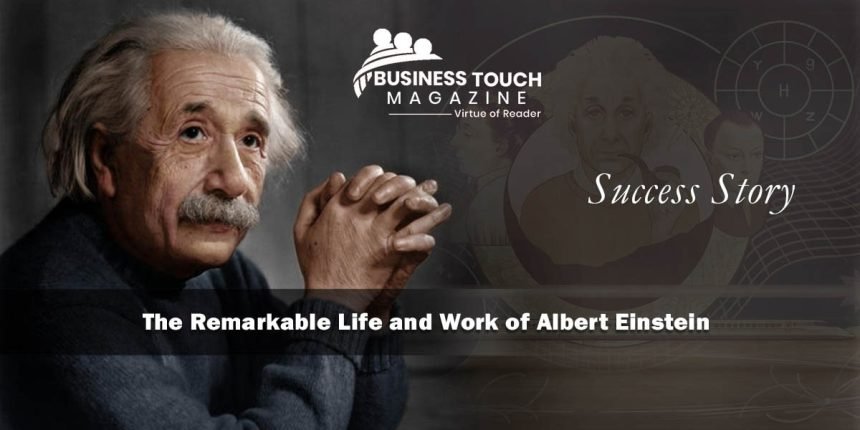Early life
On March 14, 1879, the eminent scientist and physician “Albert Einstein” was born in the city of “Ulm,” which is located in the state of Wurtemberg in Germany.
Einstein’s parents were born at a time when there was no such thing as electric light. When he was born, Thomas Edison had just started working on the electric light bulb.
Einstein did not start talking until he was far older than 3 years old. Albert Einstein’s parents had always hoped that their son will go into the medical field.
However, they were quite concerned about the child’s lack of progress in several areas of development.
Educational life
As a student, he did not demonstrate any outcomes that were particularly noteworthy. The grades were almost good enough to pass.
Only in the field of mathematics and science did he achieve fame and prominence as a student.
He was adamant on enrolling in an electrical engineering program even though he was just 16 years old.
But instead of pursuing a career in electrical engineering, he enrolled at ETH Zurich Polytechnic in a teaching program for mathematics and physics that lasted for four years.
Because he disliked sitting in on courses, he consistently did not show up for them. Every time he gives a presentation, he does it at beer halls and coffee cafes.
He duplicated all of the class notes from “Marcel Grossmann” in order to pass the tests, and as a result, he received extraordinary ratings in group work that exceeded Grossmann’s.
He did well on his tests and ultimately earned his degree as well as a teaching certificate in both mathematics and physics.
After that, he attempts to get employment as a professor’s assistant, but no one would hire him because of his defiant nature.
Job Career
After graduating, he looked for employment until he was offered a position at the “Federal office for Intellectual Property” in Bern, Switzerland.
There, he is now employed in the capacity of an assistant examiner. In the course of his career, Albert Einstein was in charge of evaluating the patent applications for a number of different innovations.
In 1902, together with new pals Maurice Solovine and Conard Habicht, Einstein met in Bern. In this location, they established a tiny group known as “The Olympia Academy.”
Einstein’s intellectual prowess has significantly improved thanks in large part to the contribution of the discussion group.
Marriage
The number of pupils in the class at the Swiss “Federal Polytechnic Institute” was limited, and there were only five of them in all.
There was just one student, a woman whose name was MilevaMaric, who became romantically engaged with Albert Einstein and married him on January 6, 1903.
Their daughter, who they called “Lieserl,” was born in Novi Sad in 1902, and it is not known what became of her.
Their daughter may have been adopted or she may have passed away at a young age from scarlet fever.
On May 14th, 1904, Maric Einstein gave birth to the couple’s first son, who they named Hans Albert Einstein.
The arrival of his baby has in no way sidetracked him from his phenomenally successful scientific career.
Miracle Year
The year 1905 was referred to as the “Miracle year,” according to the biographers of Albert Einstein. Around the year 1900, physics was split into its two primary subfields.
Isaac Newton was the most well-known figure associated with mechanics, whereas James Clark Maxwell was the most well-known figure associated with electromagnetism.
1905 is the year that Albert Einstein was born, and it is commemorated as the “Miracle Year” or “Annus Mirabilis” in Latin.
The fact that Einstein had four articles published in the scientific journal “Annalen der Physik” was the primary impetus for this particular year’s events.
People’s perspectives on time, mass, space, and energy shifted as a direct result of the publication of this article, which made a contribution to the incredible body of work that constitutes contemporary physics.
The ideas of the photoelectric effect, mass-energy equivalence, the special theory of relativity, and Brownian motion were discussed in these works.
It was 1907 that he first proposed the idea of gravity. According to him, gravity is the same thing as accelerated motion.
Because of the enhancements made to his reputation as a scientist, he was asked to deliver lectures at the “University of Bern,” which is recognized as being among the most prestigious educational institutions in the world.
Following his appointment as an associate professor at the University of Zurich in 1909, he tendered his resignation from the job he had at the patent office.
He altered his look by putting on saggy short pants and getting a hairdo that was uninteresting. Because he had a fairly relaxed demeanor, any student was free to interject at any moment.
The majority of the student’s time is spent with him, both in public places like cafés and at his private residence.
In April of 1911, he obtained citizenship in Austria while working as a full professor at the “German Charles-Ferdinand University.”
At that time, Austria was a part of the Austro-Hungarian Empire. During his time at the institution, he produced 11 papers.
Five of them were devoted to the mathematical study of radiation and the quantum theory of solids.
Second Marriage
In 1912, Einstein visited Berlin. Here, he spoke with his cousin, whose name was Elsa Lowenthal.
Mileva, his first wife, battled melancholy and eventually divorced him, taking their two boys with her.
The marriage of Albert and Mileva did not work out in the end. On February 14, 1919, Mileva and Albert Einstein finalized their divorce.
After being divorced for little over three and a half months, he quickly remarried his cousin.
The General Theory of Relativity
Between the years 1911 and 1913, Einstein works on a hypothesis that would later become known as the “General Theory of Relativity.”
The term “Gravitational lens effect” wasn’t used for the hypothesis until much later.
The science of astrophysics made extensive use of this idea during the course of its history. In addition to that, it clarifies the fundamental nature of black households.
Nobel prize:
In recognition of his outstanding contributions to theoretical physics and the discovery of the law of “photoelectric effect,” the Nobel Prize in Physics was bestowed upon him in 1921.
The important thing to point out:
The most essential strategy is the fact that he never stopped fighting against all of those things, despite the many failures and rejections he had from both individuals and the school system. He focused his attention on ideas, experiments, and investigations at all times.
This was a compelling account of a boy who did not begin talking until he was three years old, despite the fact that it was not very long.
He was a defiant kid who would often skip school when he was a teenager. He was one of the students that frequented beer halls and coffee shops on a regular basis.
The individual who had been out of work for close to two years.
Einstein was well aware of the universal truth that if you stand out from the crowd in any manner, you will always face hostility.
As a result, he never shies away from challenges and enjoys working independently according to his own whims rather than following the lead of others.
He was a diligent worker who was also resolute and never gave up. His name is now often used as a synonym for the phrase “genius.”
He was a brilliant scientist who also won the Nobel Prize and was an underappreciated lecturer.
We have high hopes that you have appreciated the fascinating account of Albert Einstein’s life and that it will inspire you to overcome any obstacles that stand in the way of achieving the success you want on your own.




